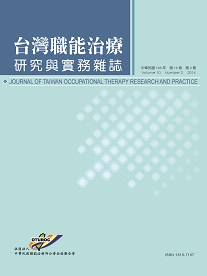Journal of Taiwan Occupational Therapy Research and Practice

半年刊,正常發行
目的:在積極健康管理優於消極之傷病賠償的觀念下,本研究試行「預防職場傷害之人因健康管理課程」,以探討人因概念落實於職場安全與保健的成效。方法:共12位醫院員工參加本課程,每週兩次,每次一小時,共進行六週。課程內容主要針對肩頸、軀幹、下背、上肢、下肢等部位,依次教導相關肌肉的伸展及強化運動,並同時教導相關工作姿勢,培養與工作相關的健康積極習慣。學員在課程前後皆接受相關的評量,以檢驗本課程的成效。結果:本課程不但改善學員的肌力、柔軟度和疼痛症狀,同時也增進其注意力,並進一步提升其在生理健康和心理層面的生活品質滿意度。結論:國內應積極推廣人因健康相關課程,並落實在職場中,以降低職場中勞工職傷的發生率。
Objective: Due to the opinion of making a good health management is better than passive compensation after an injury and disease, we arranged a class of 'Ergonomic Health Management for Preventing Work-Related Injury' to investigate the effects of ergonomic conceptualization on the improvement of occupational safety and health of workers. Methods: We taught 12 participants skills to stretch and strengthen their muscles and to form a regular exercise habit to maintain their physical fitness via a systemically serial class in one hour each day, twice per week and persisting for six weeks. Results: Not only physical conditions of muscle strength, flexibility and pain, but attention ability and satisfaction of quality of life psychologically also were found to be improved of the participants. Conclusion: In order to reduce the prevalence of work-related injuries, we strongly suggest popularizing the ergonomic health programs and practices in each work place.












